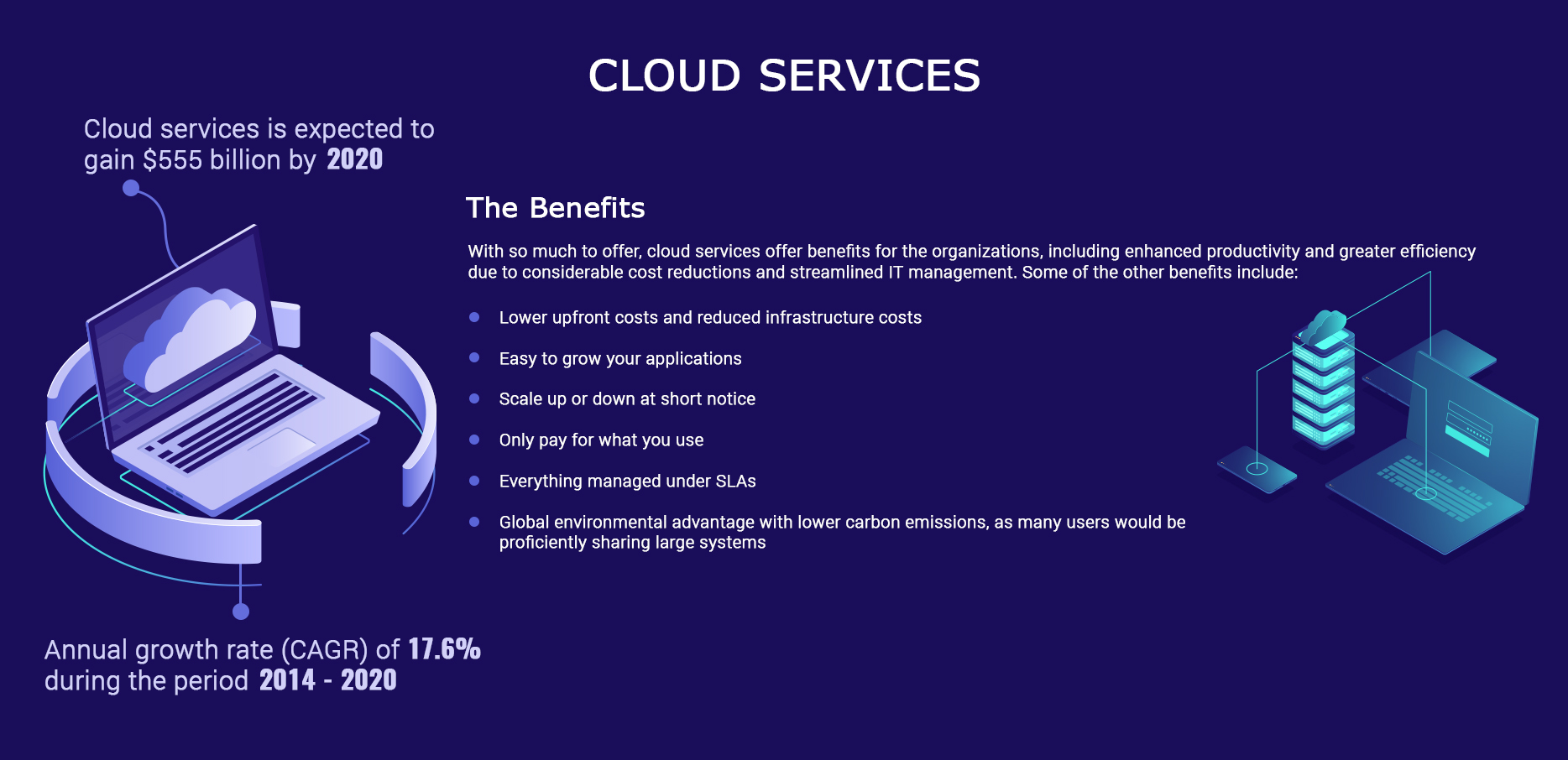Cloud Services

A report published by Allied Market Research forecasts that the global market in cloud services is expected to gain $555 billion by 2020, registering a compounded annual growth rate (CAGR) of 17.6% during the period 2014 - 2020.
Cloud services is a broad term that integrates all delivery and service models of cloud computing and related solutions, which is delivered over the internet and is accessible across the world via internet. Cloud services is a hot topic in todays’ software world.
Storage of data was getting more and more difficult with exploding data. There was a desperate need to create a service to hold the data and be used on a time-to-time basis. A virtual storage room was thus becoming essential for all IT organizations. An increasing number of organizations are heading towards cloud services due to big data, privacy concerns, and security issues. The main reasons behind opting for cloud services is its many benefits including agility, scalability, business growth, cost benefits, and innovation.
The Challenges
However, many enterprises encounter challenges with the barriers of complexity, reliability and security when seeking to implement cloud services. Rapidly developing technology presents huge technical challenges, as there are higher user expectations for the web experience. Also, new threats that exploit the vulnerabilities of cloud services seem to emerge almost daily.
Some more challenges include:
- Higher ongoing operating costs
- Dependency on service providers and reliable Internet connections
- Higher chances of being locked into proprietary or vendor-recommended systems
- Chances of supplier suddenly deciding to stop supporting a product or system you’ve come to depend on
- Privacy and security risks are imminent as users are putting their valuable data on someone else’s system in an undisclosed location
The Offerings
Cloud service can be used on an on-demand basis and shut them down when no longer necessary. In addition, under a monthly billing arrangement customers can subscribe to cloud services. In other words, customers pay for software licenses and supporting server and network infrastructure upfront. From a management standpoint, cloud-based technology allows user organizations complete access of software, its storage, and other IT infrastructural elements without the problem of sustaining and upgrading them. Therefore, after a payment, cloud services offer companies a no string attached service, which in fact makes the whole deal more attractive.
Our cloud consulting and deployment services enable customers to deploy various types of cloud services that support them in espousing the cloud-based technology.
Our cloud service offerings may include any or all of the following offerings: cloud-readiness assessment, application rationalization, migration, deployment, customization, private and public cloud integration – hybrid clouds – and ongoing management.
A few specific cloud offerings that we provide are:
Software as Service (SaaS):
This is a software distribution model we use to host applications, which are then made available to customers over a network, typically the internet. For example, G Suite, also formerly known as Google Apps, Microsoft Office 365, Salesforce and Workday.
Platform as a Service (PaaS):
We deliver operating systems and associated services over the internet without downloads or installation. In this approach, customers have the freedom to create and deploy applications without investing in the underlying infrastructure. For example, Amazon Web Services’ Elastic Beanstalk, Microsoft Azure that refers to its PaaS offering as Cloud Services, and Salesforce’s App Cloud.
Infrastructure as Service (IaaS):
In this model, we provide equipment used to support operations, including storage, hardware, servers and networking components. All of the equipment is made accessible over a network. Examples for this model includes Amazon Web Services, IBM Bluemix and Microsoft Azure.
SaaS, PaaS and IaaS are sometimes collectively referred to as the SPI model. These are also part of public cloud-based services. In the public cloud-based services, a service provider offers services to multiple customers through internet. In contrast, there is something also called as private cloud services. These are not generally made available to individual or corporate users or subscribers. Private cloud-based services always use technologies and approaches, such as virtualization and self-service, which are associated with public clouds, however, private cloud services always proceed on an organization’s private infrastructure. Private services are devoted to internal users, and not available for multiple, external customers.
The Benefits
With so much to offer, cloud services offer benefits for the organizations, including enhanced productivity and greater efficiency due to considerable cost reductions and streamlined IT management. Some of the other benefits include:
- Lower upfront costs and reduced infrastructure costs
- Easy to grow your applications
- Scale up or down at short notice
- Only pay for what you use
- Everything managed under SLAs
- Global environmental advantage with lower carbon emissions, as many users would be proficiently sharing large systems
Cloud services vs. Web services
Sometimes, cloud services are considered synonymous with web services. Although the two fields are related, they are not identical. Web services provide a way for applications or computers to communicate with each over the World Wide Web. So, web services are generally associated with machine-to-machine communications, while cloud services are generally related with scenarios in which individuals or corporate customers consume the service. However, some web services may be closely intertwined with cloud services and their delivery to individuals and organizations. For instance, cloud services often use RESTful web services, which are founded on representational state transfer (REST) technology. REST technology is regarded as providing open and definite interfaces for application and infrastructure services.
To Conclude…
The cloud, from an investigative option, is now deemed as an undeniable part of organizations’ overall IT portfolio and the adaptation of the technology is going strong in the market.
Contact our experts for your Cloud Service needs.